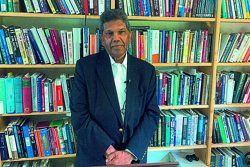Dear Editor,
The United Nations’ (UN) delegation that was here in February at the government’s request for support in the effort to proceed with constitutional reform, has submitted its report to Prime Minister Moses Nagamootoo. It is hoped the sobering input of the world’s second oldest body is heeded.
It is being advised, via the media, that the UN recommends: i) the importance of not rushing the process of constitutional reform; ii) that the process can create an opportunity for social cohesion and nation-building; iii) it must be characterised by meaningful dialogue, negotiation and compromise by the government, opposition and citizens; iv) the Constitutional Reform Commission should be independent, inclusive, and representative of civil society; and v) major attention should be paid to public education and effective participation.
What the UN has advised us in proceeding on this matter of national import is what the Guyana Constitution requires of us. The environment as outlined in Article 13 expressly states, “The principal objective of the political system of the State is to establish an inclusionary democracy by providing increasing opportunities for the participation of the citizens and their organisations in the management and decision-making processes of the State, with particular emphasis on those areas of decision-making that directly affect their well-being.”
Now that this international institution whose existence is premised on the equality of man and treating each other with dignity and respect, has spoken, it is time to cease treating the Constitution with contempt and disdain. Reducing this supreme instrument to satire and ridicule, which frankly indicates no understanding of its spirit and intent and a failure to make the effort to become acquainted with it, is hurting the nation and people’s growth and development.
I recently attended an internationally hosted panel review of the Constitution, where a panellist, who is charged with the responsibility of helping the process, admitted to not having read this instrument. In the first instance you cannot have an informed and educated conversation on something you do not know and expect to give of your best in accomplishing the task required of you. This deficiency is not singular to this panellist but pervasive across the executive, legislative and judicial branches.
The UN’s recommendation that attention be paid to public education and effective participation requires government to provide the leadership. Government has the overarching responsibility for the nation’s education and must see it as incumbent on its part to provide the requisite resources so that society, through education (formal and informal), can know what’s in the Constitution, its requirements, and citizens’ roles and responsibilities. For it is only through knowledge that effective participation can happen, and it is the foremost prerequisite for starting any process. Further, to ask people to participate in changing an instrument that they are ignorant of is to torpedo the objective which the process sets out to achieve.
Amendment/reform is permitted in the Constitution and in order to proceed with same, one has to follow the rules to change the rules. Article 119A (1) expressly states, “The National Assembly shall establish a Parliamentary Standing Committee for Constitutional Reform for the purpose of continually reviewing the effectiveness of the working of the Constitution and making periodic reports therein to the Assembly, with proposals for reform as necessary.” Subparagraph (2) goes on to state, “To assist in its work, the committee shall have power to co-opt experts or enlist the aid of other persons of appropriate expertise, whether or not such experts or other persons are members of the Assembly.”
The UN has pointed us in a direction which has been right in front of our eyes all these years and that is not dissimilar to a call being made by some in the society. The Prime Minister, who is charged with the responsibility for overseeing the constitutional reform consultation, has advised that his office submitted an $80 million budget for the programme. Let this money now be accordingly disbursed after a programme has been conceptualised and developed based on the UN’s recommendations. The Guyana Trades Union Congress participated in the UN’s engagement and awaits its copy of the report.
Yours faithfully,
Lincoln Lewis









